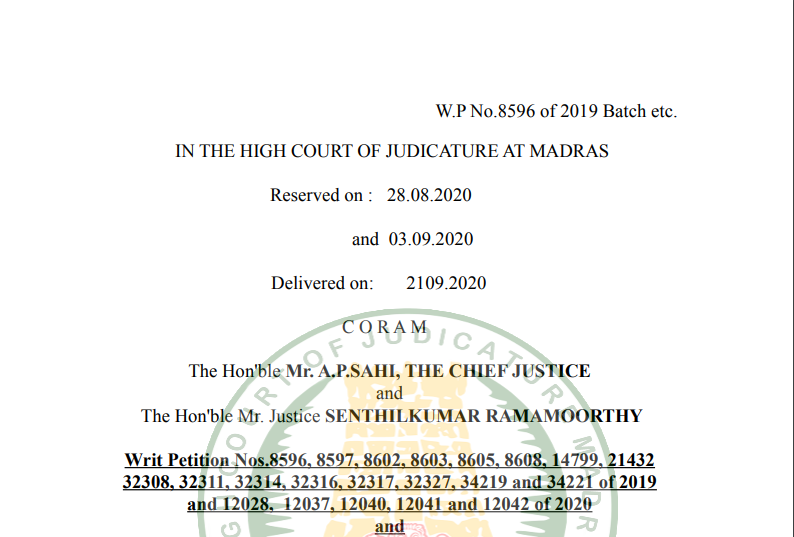Madras HC in the case of Tvl. Transtonnelstroy Afcons Joint venture
Table of Contents
Case Covered:
Tvl.Transtonnelstroy Afcons Joint venture
Versus
Union of India
Facts of the Case:
At the heart of this batch of writ petitions is the question of whether the Petitioners are entitled to a refund of the entire unutilized input tax credit that each of them has accumulated on account of being subjected to an inverted duty structure. In certain cases, the constitutional validity of Section 54(3)(ii) of the Central Goods and Services Tax Act, 2017(the CGST Act) is impugned, whereas, in others, a declaration is prayed for that the amended Rule 89(5) of the Central Goods and Services Tax Rules,2017(the CGST Rules) is ultra vires Section 54 of the CGST Act and the Constitution of India. As a corollary, a declaration of entitlement to refund is also prayed for in some cases.
One of the issues that take center-stage in these cases is the correct meaning to be ascribed to the word “inputs” in Section 54(3)(ii) of the CGST Act and in the definition of “Net ITC” in the amended Rule 89(5) of the CGST Rules. Therefore, except while dealing with the text of Section 54 and Rule 89 where the word “inputs” is used, for the sake of clarity, the words ‘input goods’ is used while dealing with goods that are used as inputs, and ‘input services’ is used while dealing with services that are used as inputs. All the Petitioners are engaged in businesses wherein the rate of tax on input goods and/or input services exceeds the rate of tax on output supplies. This contingency is referred to as an inverted duty structure. As a result, the registered person is unable to adjust the available input tax credit fully against the tax payable on output supplies; consequently, there is an accumulation of unutilized input tax credit. The case of the Petitioners is that they are entitled to a refund of the entire unutilized input tax credit, irrespective of whether such credit accumulated on account of procurement of input goods and/or input services by paying tax at a higher rate than that paid on output supplies. On the contrary, the case of the Union of India and the Tax Department, both at the Central and State level, is that refund of any unutilised input tax credit is permissible only in respect of the quantum of credit that has accumulated due to the procurement of input goods at a higher rate than that paid on output supplies, and that credit accumulation on account of procuring input services at a rate of tax higher than that paid on output supplies is liable to be disregarded for refund purposes.
Observations of the Court:
The subject matter of controversy is the entitlement to refund of unutilized input tax credit and not the availing of the input tax credit. Under Section 54(3)(ii), Parliament has provided the right of refund only in respect of unutilized credit that accumulates on account of the rate of tax on input goods being higher than the rate of tax on output supplies. Goods and services have been treated differently from time immemorial, as reflected in the use of the expressions, quantum valebant, as regards the measure of payment for goods, and quantum meruit, as regards the measure of payment for services, supplied non-gratuitously and without a formal contract. While there has been a legislative trend towards a more uniform treatment as between goods and services, the distinction has certainly not been obliterated as is evident on perusal of the CGST Act, including provisions such as Sections 12 & 13, etc., which are specifically targeted at goods and services. Keeping in mind the following factors: the inherent differences between goods and services, notwithstanding the trend towards similar treatment; the subject matter of classification, namely, curtailment of entitlement to refund of input tax credit to credit accumulated from the procurement of input goods; the equal treatment meted out to registered persons who avail input services inter se and those who procure input goods inter se; the wide Parliamentary latitude as regards classification qua tax and economic legislations, which is recognized and affirmed by the Supreme Court; and the nature and character of refund as a creation of statute and subject to statutory eligibility conditions, we are unable to countenance the contention of Mr.Ghosh that the non-conferment of the right of the refund to the unutilized input tax credit from the procurement of input services violates Article 14. On the contrary, we conclude that the classification is valid, nonarbitrary, and far from invidious.
The decision of the Court:
In view of the aforesaid analysis and discussions we hold as follows:
(i) All the writ petitions challenging the constitutional validity of Section 54(3)(ii) are dismissed.
(ii) All the writ petitions challenging the validity of Rule 89(5) of the CGST Rules on the ground that it is ultra vires Section 54(3)(ii) of the CGST Act and/or the Constitution are dismissed.
(iii) Consequently, all the writ petitions for a mandamus to direct the refund claims to be processed are dismissed.
(iv) Hence, all the connected miscellaneous petitions are closed. There will be no order as to costs in the facts and circumstances.
Read & Download the Full Decision in pdf:
 ConsultEase Administrator
ConsultEase Administrator
Consultant
Faridabad, India
As a Consultease Administrator, I'm responsible for the smooth administration of our portal. Reach out to me in case you need help.








